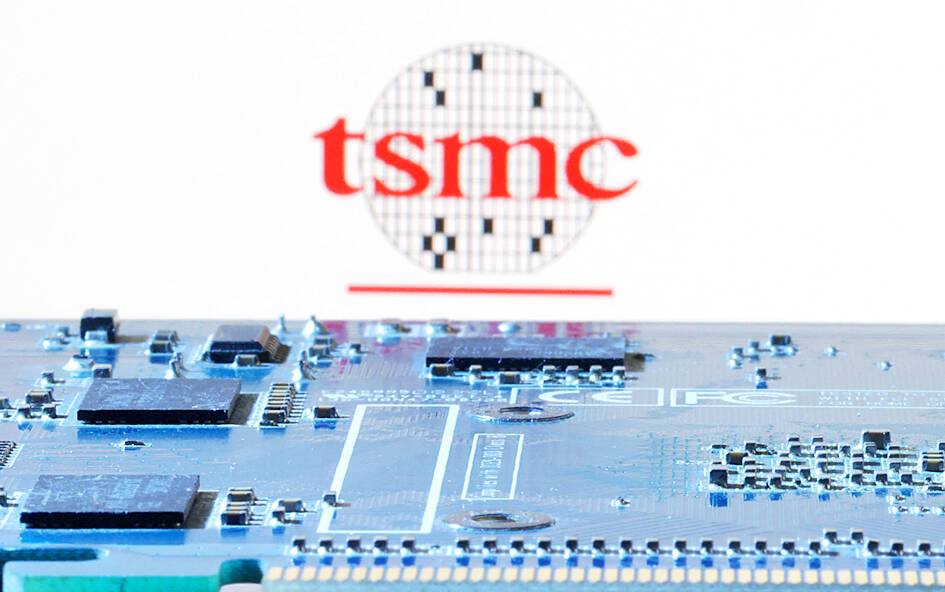Taiwan Semiconductor Manufacturing Co (TSMC, 台積電) said yesterday it was still considering venue options for its new advanced wafer fab, contrary to a local media report earlier in the day that the chipmaker was planning to build a 1-nanometer wafer plant in Chiayi County.
While the world’s largest contract chipmaker did not directly comment on the matter of Chiayi as a potential location, TSMC said in a statement that the company would need to consider all factors before making a final decision on where to build the 1-nanometer fab.
The Chinese-language Economic Daily News cited unnamed sources as saying that TSMC had submitted an application to the authorities supervising the Chiayi section of the Southern Taiwan Science Park (南部科學園區) for 100 hectares of land so it could expand operations.

Photo: Dado Ruvic, Reuters
The report said TSMC was expected to use 60 of the 100-hectare parcel to build a 1-nanometer fab, while the remaining 40 hectares were to be used to set up an advanced IC packaging and testing plant to provide a one-stop service for its clients.
It is estimated that TSMC would spend more than NT$1 trillion (US$31.89 billion) in its 1-nanometer process development, the report said.
In the statement, TSMC said that Taiwan is the hub for the chipmaker’s worldwide expansion.
TSMC added that it was not ruling out any potential venue and that it would continue working with science park authorities to choose a location for the investment.
However, the chipmaker did not specify whether the authorities it was in discussions with were the Southern Taiwan Science Park, the Central Taiwan Science Park (中部科學園區) or the Hsinchu Science Park (新竹科學園區).
Last month, Taichung Mayor Lu Shiow-yen (盧秀燕) told a Taichung City Council hearing that TSMC would build a fab in the second phase of Central Taiwan Science Park expansion that would use more advanced technology than the 2-nanometer process.
TSMC is building a 2-nanometer fab in Hsinchu County’s Baoshan Township (寶山) with commercial production scheduled to start next year. The 2-nanometer production is to be expanded to Kaohsiung with two fabs planned.
Last week, TSMC said it was evaluating the possibility of building a third 2-nanometer process fab in Kaohsiung following strong demand.

When an apartment comes up for rent in Germany’s big cities, hundreds of prospective tenants often queue down the street to view it, but the acute shortage of affordable housing is getting scant attention ahead of today’s snap general election. “Housing is one of the main problems for people, but nobody talks about it, nobody takes it seriously,” said Andreas Ibel, president of Build Europe, an association representing housing developers. Migration and the sluggish economy top the list of voters’ concerns, but analysts say housing policy fails to break through as returns on investment take time to register, making the

EARLY TALKS: Measures under consideration include convincing allies to match US curbs, further restricting exports of AI chips or GPUs, and blocking Chinese investments US President Donald Trump’s administration is sketching out tougher versions of US semiconductor curbs and pressuring key allies to escalate their restrictions on China’s chip industry, an early indication the new US president plans to expand efforts that began under former US president Joe Biden to limit Beijing’s technological prowess. Trump officials recently met with their Japanese and Dutch counterparts about restricting Tokyo Electron Ltd and ASML Holding NV engineers from maintaining semiconductor gear in China, people familiar with the matter said. The aim, which was also a priority for Biden, is to see key allies match China curbs the US

NOT TO WORRY: Some people are concerned funds might continue moving out of the country, but the central bank said financial account outflows are not unusual in Taiwan Taiwan’s outbound investments hit a new high last year due to investments made by contract chipmaker Taiwan Semiconductor Manufacturing Co (TSMC, 台積電) and other major manufacturers to boost global expansion, the central bank said on Thursday. The net increase in outbound investments last year reached a record US$21.05 billion, while the net increase in outbound investments by Taiwanese residents reached a record US$31.98 billion, central bank data showed. Chen Fei-wen (陳斐紋), deputy director of the central bank’s Department of Economic Research, said the increase was largely due to TSMC’s efforts to expand production in the US and Japan. Investments by Vanguard International

The popular Taiwan Semiconductor Manufacturing Co (TSMC, 台積電) arbitrage trade might soon see a change in dynamics that could affect the trading of the US listing versus the local one. And for anyone who wants to monetize the elevated premium, Goldman Sachs Group Inc highlights potential trades. A note from the bank’s sales desk published on Friday said that demand for TSMC’s Taipei-traded stock could rise as Taiwan’s regulator is considering an amendment to local exchange-traded funds’ (ETFs) ownership. The changes, which could come in the first half of this year, could push up the current 30 percent single-stock weight limit